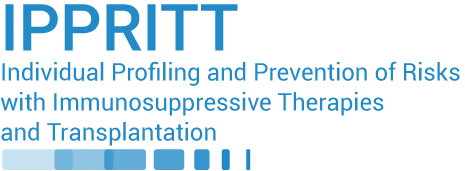Conversion from everolimus with low-exposure cyclosporine to everolimus with mycophenolate sodium maintenance therapy in kidney transplant recipients: a randomized, open-label multicenter study.
Abstract
BACKGROUND: Data in kidney transplant recipients regarding elimination of calcineurin inhibitor (CNI) therapy from a de novo regimen based on low CNI exposure and an mTOR inhibitor are sparse, and restricted to CNI elimination within the first six months post-transplant. MATERIAL/METHODS: In a 12-month, randomized, multicenter, open-label study, kidney transplant patients who had received everolimus, low-exposure cyclosporine and corticosteroids from transplantation to month 12 (with proteinuria <1 g/24 h at month 12) were randomized to convert from cyclosporine to mycophenolate sodium 720 mg/day with increased everolimus exposure (6-10 ng/mL [CNI-free group], n=15) or continue unchanged (everolimus 3-8 ng/mL [CNI group], n=15). RESULTS: Median (range) baseline mGFR was 54 (21-87) mL/min and 37 (range 18-69) mL/min (p=0.053) in the CNI-free and CNI groups, respectively, compared to 56 (18-126) mL/min and 32 (12-63) mL/min at month 12 (p=0.007). The between-group difference in change in mGFR from baseline to month 12 post-conversion (the primary endpoint) was -14.4 mL/min (95% CI -29.3 to 0.6 mL/min, p=0.059 [least squares mean]). Changes in serum creatinine and estimated GFR to month 12 were significantly in favor of CNI-free patients. One CNI patient experienced biopsy-proven acute rejection. Study drug was discontinued due to adverse events in one CNI-free patient (7%) and three CNI-treated patients (20.0%). CONCLUSIONS: Elimination of CNI from a de novo regimen of everolimus with low-exposure CNI at one year post-transplant maintained efficacy and led to a non-significant but clinically relevant improvement in renal function, although patients numbers were low (n=30). Findings from this small study require confirmation in a larger controlled trial.



